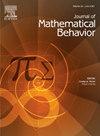Mature intuition and mathematical understanding
IF 1.7
Q3 EDUCATION & EDUCATIONAL RESEARCH
引用次数: 0
Abstract
Mathematicians often describe the importance of well-developed intuition to productive research and successful learning. But neither education researchers nor philosophers interested in epistemic dimensions of mathematical practice have yet given the topic the sustained attention it deserves. The trouble is partly that intuition in the relevant sense lacks a usefully clear characterization, so we begin by offering one: mature intuition, we say, is the capacity for fast, fluent, reliable and insightful inference with respect to some subject matter. We illustrate the role of mature intuition in mathematical practice with an assortment of examples, including data from a sequence of clinical interviews in which a student improves upon initially misleading covariational intuitions. Finally, we show how the study of intuition can yield insights for philosophers and education theorists. First, it contributes to a longstanding debate in epistemology by undermining epistemicism, the view that an agent’s degree of objectual understanding is determined exclusively by their knowledge, beliefs and credences. We argue on the contrary that intuition can contribute directly and independently to understanding. Second, we identify potential pedagogical avenues towards the development of mature intuition, highlighting strategies including adding imagery, developing associations, establishing confidence and generalizing concepts.
成熟的直觉和数学理解力
数学家们经常描述完善的直觉对于富有成效的研究和成功的学习的重要性。但是,无论是教育研究者还是对数学实践的认识论层面感兴趣的哲学家,都还没有对这一话题给予应有的持续关注。问题的部分原因在于,相关意义上的直觉缺乏一个有用的明确表征,因此,我们首先提出一个表征:我们说,成熟的直觉是对某些主题进行快速、流畅、可靠和有洞察力的推理的能力。我们用各种例子来说明成熟直觉在数学实践中的作用,其中包括一连串临床访谈的数据,在这些数据中,一个学生改进了最初误导性的协变直觉。最后,我们展示了直觉研究如何为哲学家和教育理论家提供启示。首先,它对认识论中长期存在的争论做出了贡献,破坏了认识论,即一个人对客观事物的理解程度完全由其知识、信念和可信度决定的观点。相反,我们认为直觉可以直接、独立地促进理解。其次,我们确定了发展成熟直觉的潜在教学途径,强调了包括增加想象、发展联想、建立信心和概括概念在内的策略。
本文章由计算机程序翻译,如有差异,请以英文原文为准。
求助全文
约1分钟内获得全文
求助全文
来源期刊

Journal of Mathematical Behavior
EDUCATION & EDUCATIONAL RESEARCH-
CiteScore
2.70
自引率
17.60%
发文量
69
期刊介绍:
The Journal of Mathematical Behavior solicits original research on the learning and teaching of mathematics. We are interested especially in basic research, research that aims to clarify, in detail and depth, how mathematical ideas develop in learners. Over three decades, our experience confirms a founding premise of this journal: that mathematical thinking, hence mathematics learning as a social enterprise, is special. It is special because mathematics is special, both logically and psychologically. Logically, through the way that mathematical ideas and methods have been built, refined and organized for centuries across a range of cultures; and psychologically, through the variety of ways people today, in many walks of life, make sense of mathematics, develop it, make it their own.
 求助内容:
求助内容: 应助结果提醒方式:
应助结果提醒方式:


